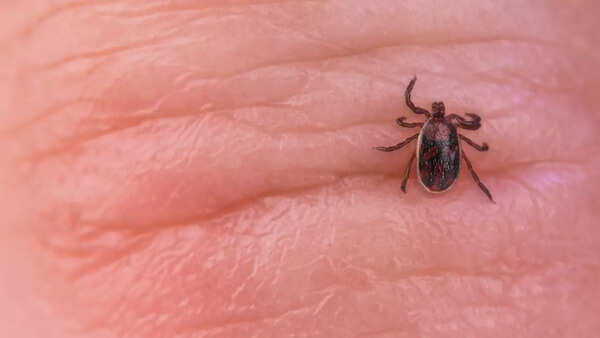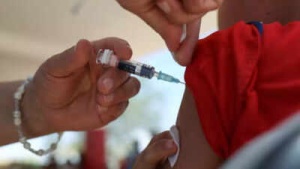Maria Palen, a 31-year-old chemical engineer from California, embodied fitness and health. Boasting a vibrant plant-based diet and a dedicated exercise routine, she inspired over 20,000 followers on Instagram. However, her story took an unexpected turn when she was diagnosed with babesiosis, a parasitic infection transmitted through tick bites. By late 2024, this condition had tragically led to paralysis from the waist down.
 *Image credit: Instagram/planthlete_maria*
*Image credit: Instagram/planthlete_maria*
Maria's experience underscores a crucial point: outward appearances of health can mask underlying, invisible battles. Her ordeal serves as a stark reminder of the hidden dangers associated with tick-borne illnesses, particularly for those who enjoy outdoor activities.
Initially, Maria experienced subtle symptoms: inflammation, joint discomfort, and persistent thumb pain. She initially addressed these issues by adopting an even stricter diet and intensifying her exercise regimen. Unfortunately, instead of improving, her condition deteriorated significantly.
By March 2024, she was largely confined to her bed. Simple tasks, such as using her phone or opening a can, became major challenges.
A functional medicine specialist eventually identified the root cause: babesiosis. This lesser-known tick-borne disease is caused by Babesia parasites that infect red blood cells. Unlike Lyme disease, babesiosis often goes unnoticed initially, as its symptoms resemble common ailments like the flu or general fatigue. The Centers for Disease Control and Prevention (CDC) reports a significant rise in babesiosis cases, doubling from 1,000 in 2011 to approximately 2,500 annually today.
Maria suspects that the tick bite occurred years prior, possibly during a hike, and went undetected. Over time, the infection advanced, ultimately impacting her nervous system. By October 2024, severe tailbone pain prevented her from sitting. Paralysis soon followed.
Tick bites are often inconspicuous – small, painless, and easily overlooked. A major concern is the prolonged dormancy period of some infections. Maria's situation highlights the limited awareness surrounding less common tick-borne diseases like babesiosis, rather than a lack of caution on her part.
Ticks are most active during warmer months, thriving in grassy and wooded environments. The 2024 tick season in the US was particularly severe due to milder winters, which led to increased survival rates among animals that host ticks. Researchers at the University of California, Riverside, warn that this surge in tick populations elevates the risk of rare infections spreading silently.
The microbes responsible for babesiosis (Babesia microti and B. duncani) are difficult to detect because they reside within red blood cells. Recent genomic research on B. duncani reveals similarities to the malaria parasite, explaining why initial symptoms can include fever, chills, and muscle aches before escalating in severity.

Maria's story demonstrates her strength and determination in the face of adversity. Despite undergoing extensive therapy, she remains optimistic about regaining movement in her legs. Her experience underscores the critical importance of early detection in treating tick-borne illnesses.
While doctors often test for Lyme disease when tick-borne illnesses are suspected, babesiosis is not always considered. Furthermore, as the two diseases can coexist, symptoms may be misattributed. Healthcare providers should adopt a broader diagnostic approach, and individuals should be vigilant in monitoring any unexplained changes in energy levels, muscle strength, or chronic pain, particularly after spending time outdoors.
The risk extends beyond hiking and camping. Even gardening in overgrown backyards or walking through wooded areas can expose individuals to ticks, especially without protective clothing or tick repellents.
While standard advice includes wearing long sleeves and checking for ticks, Maria's experience calls for a more thorough approach:
[This article is for informational purposes only and does not substitute professional medical advice. Consult a healthcare provider for any health concerns.]
Newer articles
Older articles
 Gavaskar Calls for Kuldeep Yadav's Inclusion in Second Test Amid Bumrah Fitness Concerns, Cites Edgbaston Spin Advantage
Gavaskar Calls for Kuldeep Yadav's Inclusion in Second Test Amid Bumrah Fitness Concerns, Cites Edgbaston Spin Advantage
 Indian Astronaut Shukla Arrives at ISS, Ushering in New Era for Space Program
OR
India Celebrates as Shukla Reaches ISS, Advancing Ambitious Space Goals
Indian Astronaut Shukla Arrives at ISS, Ushering in New Era for Space Program
OR
India Celebrates as Shukla Reaches ISS, Advancing Ambitious Space Goals
 Rishabh Pant Revolutionizing Cricket, Says Greg Chappell
Rishabh Pant Revolutionizing Cricket, Says Greg Chappell
 Toxic Workplace Warning Signs: Spot the Red Flags Early
Toxic Workplace Warning Signs: Spot the Red Flags Early
 Global Immunization Crisis: Millions of Children at Risk as Vaccine Coverage Lags, Study Reveals
Global Immunization Crisis: Millions of Children at Risk as Vaccine Coverage Lags, Study Reveals
 Moto G54 Price Slashed in India: Check Out the Discounted Rates and Specs
Moto G54 Price Slashed in India: Check Out the Discounted Rates and Specs
 Indian Cricket Star Mukesh Kumar and Wife Divya Singh Announce the Arrival of Baby Boy
Indian Cricket Star Mukesh Kumar and Wife Divya Singh Announce the Arrival of Baby Boy
 IRCTC Launches AI Chatbot 'AskDisha 2.0' to Revolutionize Train Ticket Booking and Customer Service
IRCTC Launches AI Chatbot 'AskDisha 2.0' to Revolutionize Train Ticket Booking and Customer Service
 Cummins Lauds Australia's Dominant Start to WTC Campaign After West Indies Series Win
Cummins Lauds Australia's Dominant Start to WTC Campaign After West Indies Series Win
 Smith Targets Test Return After Innovative Baseball Cage Rehab in New York
Smith Targets Test Return After Innovative Baseball Cage Rehab in New York